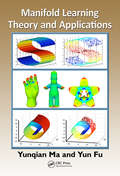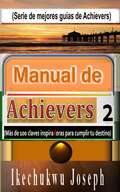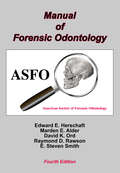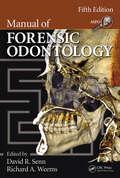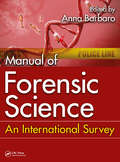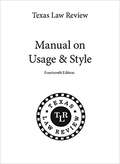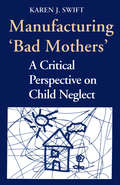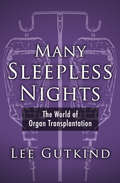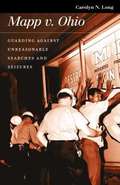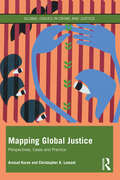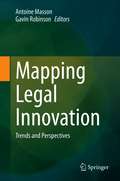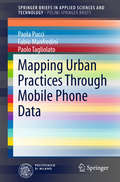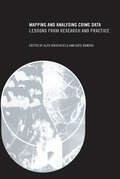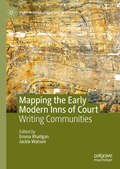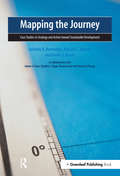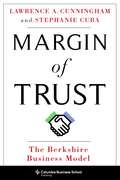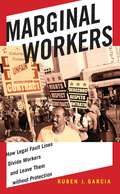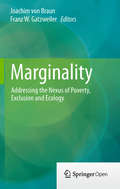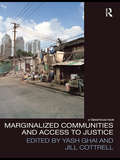- Table View
- List View
Manifold Learning Theory and Applications
by Yunqian Ma Yun FuTrained to extract actionable information from large volumes of high-dimensional data, engineers and scientists often have trouble isolating meaningful low-dimensional structures hidden in their high-dimensional observations. Manifold learning, a groundbreaking technique designed to tackle these issues of dimensionality reduction, finds widespread
Manual de Achievers 2: Serie de mejores guías de Achievers Libro 2 (mejor serie de guías de Achievers #2)
by Ikechukwu JosephManual de Achievers 2 Serie de mejores guías de Achievers El libro dos es una continuación del libro uno y contiene más de cien claves inspiradoras y motivacionales y pepitas de éxito que lo ayudarán a cumplir su Destino y aprovechar su potencial. Es una llamada de atención para cualquiera que quiera sobresalir en la vida. Este libro le ayudará en las estrategias de resolución de problemas, para descubrir y aprovechar sus potenciales. Este manual, manual de negocios y resúmenes de éxito es una lectura obligada y excelente para aquellos que desean cumplir sus sueños. Es para gente de negocios, triunfadores, innovadores, consejeros, entrenadores de vida, líderes, trabajadores, pastores, etc.
Manual of Forensic Odontology
by Andzrej HuczynskiThe most exhaustive book on forensic dentistry, the fourth edition of this volume covers the latest advances in the field, including regulations affecting forensic dental practice and procedures in light of the Health Insurance Portability and Accessibility Act, updated ABFO guidelines, and new digital radiographic and photographic developments. Th
Manual of Forensic Odontology
by David Williams David GreeneAdvances in forensic odontology have led to improvements in dental identification for individual cases as well as in disaster victim identification (DVI). New and updated technologies mean advances in bitemark analysis and age estimation. Growth in the field has strengthened missing persons networks leading to more and faster identifications of un
Manual of Forensic Science: An International Survey
by Anna BarbaroA truly international and multi-disciplinary compendium of current best practices authored by top practitioners from around the world, the book covers current trends and technology advances in the following disciplines within forensic science: bloodstain pattern analysis, forensic photography, ballistics, latent prints, forensic genetics and DNA, questioned documents, forensic toxicology, forensic clinical medicine, forensic pathology, forensic odontology, forensic anthropology, forensic entomology, forensic biometry, forensic psychology and profiling, law comparison and ethics, and much more. The book serves as an invaluable resource and handbook for forensic professionals throughout the world.
Manufactured Gas Plant Remediation: A Case Study
by Allen W. Hatheway Thomas B. SpeightThe assessment, remediation, and redevelopment of manufactured gas plant (MGP) sites pose a significant technical and financial challenge to successor property owners, including municipalities and other public entities undertaking brownfields revitalization, and to their consulting environmental engineers. Due to the toxicity of many coal tar constituents, sites contaminated as a result of gasworks operations pose a significant threat to public health. This book will discuss the history of the manufactured gas industry in Massachusetts (the largest in the US), as well as the toxicity of gasworks waste products, technical challenges in the cleanup process, and the process for site cleanups.
Manufacturing 'Bad Mothers': A Critical Perspective on Child Neglect
by Karen SwiftChild neglect has been characterized over the past century as a problem of deficient care of children by mothers. A complex and punitive child welfare system has emerged, based on a view that the children of these mothers require legally sanctioned rescue by those better suited to care for them. Karen Swift challenges both the accepted view of child neglect and the present official response to it. Beginning from a critical theoretical perspective, she argues that our usual perceptions of neglect hide and distort important social realities. This distorted perception only serves to reproduce the conditions of poverty, marginalization, and violence in which these families live. The current child welfare system, far from rescuing neglected children, helps instead to ensure the continuation of their problems, and the outcome is especially dramatic and damaging in Aboriginal communities. Swift explores the historical, organizational, and professional dimensions within which child neglect becomes a visible social reality. Also examined are relations of class, race, and gender embedded in our usual understanding of child neglect. The discussion shows how these relations are continually reproduced through ordinary, everyday work practices of social workers and others who deal with mothers accused of child neglect. The 'good parent' model, through which help and authority are apparently merged, continually indicates that the mothers are unworthy of help. Their own experience disappears as they are faced with procedures designed to examine their present suitability for the job of parenting. The same procedures produce children as actually being helped through the exertion of state authority over their parents – but most of the help provided children is theoretical, and some of it is quite damaging. Swift also looks at both current and alternative notions of helping families. Finally, she argues that each of us can help to transform oppressive social realities.
Many Hills yet to Climb: Memoirs of an Armenian Deportee
by John MinassianVictims of tragedies seldom are able to tell of their experiences objectively and without bitterness. It is usually left to others to interpret—and fictionalize—such events. Many Hills Yet to Climb is an exception because its author is an exceptional man. As a young man coming of age, John Minassian lived through the Armenian genocide from 1895 through 1915, which even today the Turkish government denies ever occurred. Now, nearly a century later, Minassian describes his experiences—the destruction of his home, the loss and scattering of family and friends, the bitter enmity between two cultures—in a unique memoir. He does not attempt to give a global significance to the events, but rather a human document that lets us see things as a perceptive and sensitive teenage boy saw them at the turn of the twentieth century. JOHN MINASSIAN was born in 1895 of Armenian parents in Sivas, in central Turkey. He started school with the American missionaries in Sivas and finished his grammar school education in 1908 in Gurun. In 1913 he attended the American Teachers College in Sivas. His studies ended in 1914 with the outbreak of the first World War. During the war he was deported, with most Armenians, to Aleppo. Concealing his identity, he fled into the Syrian desert where he worked with Turkish, German, and Indian work crews. After the war, he went to Constantinople, where he worked for the post-war British Army. In 1920, he gained passage to the U.S. in 1920. He lives today with his wife, Mary, in Santa Barbara, California.
Many Layers of Ecocentrism: Revering Life, Revering the Earth
by Abhik GuptaThis book unveils the myriad streams of ecocentric thoughts that have been flowing through the human mind – in indigenous communities, in the wisdom of philosophers, in the creative expressions of poets and writers – sometimes latent, but sometimes more explicit. The strength of this book lies in the fact that it attempts to show that ecocentrism had not emerged suddenly as a distinct line of philosophical thought or found its place among the various normative approaches toward nature, but the seeds of ecocentrism had always been running through human societies. Thus, this book not only emphasizes the “unity of life” but also reveals the inherent unity of all hues of ecocentrism. The book adopts a multidisciplinary approach, which is essential to dwell on a topic like ecocentrism which permeates the domains of disciplines as disparate as science, philosophy, religion, normative ethics, myths and folklore, poetry, and literature, among others. Despite this eclectic approach, the book attempts to maintain continuity among the chapters and present these concepts in a simple form that will be easily accessible by readers from all conceivable backgrounds. This book would be useful to the students, researchers, and faculty from the fields of ecology and environmental science, philosophy, sociology, religious studies, and literature. It will also be an indispensable companion for all nature lovers, activists, and general readers interested in the emergence and evolution of environmental thoughts.
Many Sleepless Nights: The World of Organ Transplantation
by Lee GutkindWinner of the American Heart Association&’s Howard W. Blakeslee Award for outstanding achievement in scientific journalism: Lee Gutkind&’s riveting and groundbreaking account of the science, ethics, and life-changing capacity of organ transplantationOver the past six decades, the rapid advances in transplant surgery rank among the most impressive and significant in modern human history. But the procedures, which have an astonishing power to improve or even save lives, are often fraught with an unrivaled level of complexity. Seeking to better understand the world of transplant surgery, Lee Gutkind embedded himself for four years in the University of Pittsburgh&’s Presbyterian-University and Children&’s Hospitals, one of the largest transplant centers in the world. He got to know the doctors, researchers, patients, and families involved, while also exploring the history of transplantation and the often insoluble ethical quandaries it poses.Mesmerizing and unforgettable, Many Sleepless Nights depicts with uncanny insight the tremendous effort, suffering, and fortitude of the individuals whose lives have been changed forever by organ transplantation.
Mapp V. Ohio: Guarding Against Unreasonable Searches And Seizures (Landmark Law Cases And American Society Ser.)
by Carolyn N. LongAlthough she came to be known as merely "that girl with the dirty books," Dollree Mapp was a poor but proud black woman who defied a predominantly white police force by challenging the legality of its search-and-seizure methods. Her case, which went all the way to the Supreme Court, remains hotly debated and highly controversial today. In 1957, Cleveland police raided Mapp's home on a tip—from future fight promoter Don "the Kid" King—that they'd find evidence linked to a recent bombing. What they confiscated instead was sexually explicit material that led to Mapp's conviction for possessing "lewd and lascivious books"—a conviction that initially pitted Ohio police and judges against Mapp and the American Civil Liberties Union. At stake was not only the search-and-seizure question but also the "exclusionary rule" concerning the use of evidence not specified in a search warrant. Carolyn Long follows the police raid into Mapp's home and then chronicles the events that led to the Court's 5-4 ruling in Mapp v. Ohio (1961), which redefined the rights of the accused and set strict limits on how police could obtain and use evidence. Long traces the case through the legal labyrinth, discusses the controversies it created, and assesses its impact on police behavior, as well as subsequent prosecutions and convictions of the accused. She also analyzes Justice Tom Clark's creative use of Mapp's case to overturn Wolf v. Colorado, which had ruled that the Fourth Amendment's protection against unreasonable searches applied only to federal law, and presents Justice John Harlan's strong federalist-based dissent. As entertaining as it is informative, Long's book features a host of intriguing characters: Mapp, her seasoned and determined attorney, A. L. Kearns, and police sergeant Carl Delau, among others. Combined with her concise and insightful explanations of key legal principles—including the exclusionary rule itself—Long's deft narrative provides an ideal format for teachers and students in criminology, legal history, constitutional law, and political science, as well as anyone who loves a good story. The Mapp case is still much debated, especially in light of the recent reauthorization of the U.S. Patriot Act and the free rein given to law enforcement officers in matters of search and seizure. Long's compelling study thus poses important questions regarding privacy and individual rights that still matter today, even as it also illuminates one of the keystones of the Warren Court's criminal procedure revolution.
Mapping Global Justice: Perspectives, Cases and Practice (Global Issues in Crime and Justice)
by Christopher K. Lamont Arnaud KurzePersistent international conflicts, increasing inequality in many regions or the world, and acute environmental and climate-related threats to humanity call for a better understanding of the processes, actors and tools available to face the challenges of achieving global justice. This book offers a broad and multidisciplinary survey of global justice, bridging the gap between theory and practice by connecting conceptual frameworks with a panoply of case studies and an in-depth discussion of practical challenges. Connecting these critical aspects to larger moral and ethical debates is essential for thinking about large, abstract ideas and applying them directly to specific contexts. Core content includes: Key debates in global justice from across philosophy, postcolonial studies, political science, sociology and criminology The origins of global justice and the development of the human rights agenda; peacekeeping and post-conflict studies Global poverty and sustainable development Global security and transnational crime Environmental justice, public health and well-being Rather than providing a blueprint for the practice of global justice, this text problematizes efforts to cope with many justice related issues. The pedagogical approach is designed to map the difficulties that exist between theory and praxis, encourage critical thinking and fuel debates to help seek alternative solutions. Bringing together perspectives from a wealth of disciplines, this book is essential reading for courses on global justice across criminology, sociology, political science, anthropology, philosophy and law.
Mapping Legal Innovation: Trends and Perspectives
by Antoine Masson Gavin RobinsonThe legal sector is being hit by profound economic and technological changes (digitalization, open data, blockchain, artificial intelligence ...) forcing law firms and legal departments to become ever more creative in order to demonstrate their added value. To help lawyers meet this challenge, this book draws on the perspectives of lawyers and creative specialists to analyze the concept and life cycle of legal innovations, techniques and services, whether related to legislation, legal engineering, legal services, or legal strategies, as well as the role of law as a source of creativity and interdisciplinary collaboration.
Mapping Urban Practices Through Mobile Phone Data
by Paola Pucci Fabio Manfredini Paolo TagliolatoThis book explains the potential value of using mobile phone data to monitor urban practices and identify rhythms of use in today's cities. Drawing upon research conducted in the Italian region of Lombardy, the authors demonstrate how maps based on mobile phone data, which are better tailored to the dynamic processes at work in cities, can document urban practices, provide new insights into spatial and temporal patterns of mobility, and assist in recognizing different communities of practice. The described methodology permits detailed visualization of the spatial distribution of mobility flows and offers a more extensive and refined description of the distribution of urban activity than is provided by traditional travel surveys. The book also details how maps derived by processing mobile phone data can assist in the definition of urban policies that will deliver services that match cities' needs, facilitate the management of large events (inflow, outflow, and monitoring), and reflect time-dependent phenomena not included in traditional analyses.
Mapping and Analysing Crime Data: Lessons from Research and Practice
by Kate Bowers Alex HirschfieldOne of the key methods of reducing and dealing with criminal activity is to accurately gauge and then analyse the geographical distribution of crime (from small scale to large scale areas). Once the police and government know what areas suffer most from criminal activity they can assess why this is the case and then deal with it in the most effecti
Mapping the Early Modern Inns of Court: Writing Communities (Early Modern Literature in History)
by Emma Rhatigan Jackie WatsonThis collection of essays presents recent research on the Inns of Court and their place in the literature and culture of the early modern world. The volume is structured in three sections. Section One looks at the institutional spaces of the Inns themselves. The chapters consider how the Innsmen&’s identities and writings were shaped by their participation in the communal life of the legal Societies. Section Two looks at the Inns in the context of early modern London. The chapters attend to the intellectual and cultural traffic between the Inns and the city in which they were located by examining the role of Innsmen in the book trade, the circulation of manuscripts, playhouses, and musical culture. Finally, Section Three sets a wider international context. The chapters focus on the role of Innsmen in translation, nation-building, and early colonisation. Together these sections attend to the Innsmen not only as writing communities in themselves, but as participants in a complex of intersecting networks reaching out into London and beyond.
Mapping the Journey: Case Studies in Strategy and Action toward Sustainable Development
by Lorinda R. Rowledge Russell Barton Kevin Brady James Fava Cynthia Figge Konrad Saur Steven YoungThis illuminating new book presents a series of in-depth case studies from around the world based on numerous personal interviews with organizational leaders and focusing on their journey towards sustainability. The aim is to provide visions of a more sustainable future, and shed light on the path, milestones and solutions – in particular the management processes these organizations employed – to provide a reliable compass that others can follow. Although each organization must take steps to fit its particular circumstance, business conditions and culture, Mapping the Journey proves that valuable lessons can be learned by setting aside critique as to where these organizations may yet make progress and instead focusing on the guidelines, targets, measures of success, tools and techniques and valuable wisdom about how pioneer organisations are travelling toward a prosperous, sustainable future. Each organization included has crafted its own unique strategic responses to an identified need for increased sustainability. While none can be said to have reached the end-point of a sustainable development strategy, all have found that, by addressing the challenge of sustainable industrial practices, they have found innovative solutions, new opportunities for revenue generation, better relationships with customers, new business and product opportunities and a boost to morale from the executive ranks to front-line employees. Mapping the Journey examines both public and private organizations worldwide: SJ Rail of Sweden; Sony Corporation; SC Johnson; TransAlta Corporation; Patagonia; Henkel; Volvo; ASG; Interface Flooring Systems; Suncor; DaimlerChrysler; AssiDoman; Germany's Centre for Technology Assessment and the Dutch National Environmental Policy Plan. These case studies provide an inspiring framework of effective processes for defining a sustainable development strategy and transforming it successfully into actions and results.
Maqāṣid al-Sharī‘a and Contemporary Reformist Muslim Thought: An Examination
by Adis DuderijaIt is the first study which comprehensively, systematically and critically examines the role and usefulness of the concept of Maqasid al-Shari'a (higher Objectives of Islamic Law) in contemporary Muslim reformist thought in relation to number of specific issues pertaining to Islamic legal philosophy, law, ethics and the socio-political sphere.
Marek Thee: A Journey through the 20th Century (SpringerBriefs on Pioneers in Science and Practice #32)
by Nils Petter Gleditsch Marta Bivand Erdal Stein Tønnesson Marek TheeMarek Thee was a Jewish Polish journalist, scholar, and activist. This book tells his life from narrowly escaping death in the Holocaust to exile in Palestine, where he became attached to the Polish consular service. On his return to Poland in 1950, he worked for the Foreign Ministry and later for the Polish Institute for International Affairs. He served as Head of the Polish delegation to the International Control Commission in Indochina in the late 1950s. In 1968 he lost his job and his Polish citizenship in a nationalistic and antisemitic campaign. He was able to move to Norway where he worked for twenty years at the Peace Research Institute Oslo (PRIO), editing an international quarterly journal, Bulletin of Peace Proposals and doing research on the arms race. In retirement, he continued his research and writing at the Norwegian Human Rights Institute. The book vividly relates the drama of his life in Poland, Palestine, Indochina, and Norway.This is an open access book.
Margin of Trust: The Berkshire Business Model
by Lawrence Cunningham Stephanie CubaWarren Buffett and his company, Berkshire Hathaway, are legendary for their distinctive investing approach. Yet many equally unconventional but less well known aspects of Berkshire’s managerial practices and organizational structure are rich with lessons for those seeking to follow in Buffett’s footsteps. Margin of Trust is the first book to distill Buffett’s approach to management and corporate life. It provides a definitive analysis of the tenets of the Berkshire system, its costs and benefits, and how it can be adapted for other organizations.Lawrence A. Cunningham and Stephanie Cuba develop a new account of how Berkshire Hathaway works, showing that the key to its success is trust. Profiling partnership practices and business methods, they contend that Berkshire’s distinguishing feature is a culture in which autonomy and decentralization are core management principles. Cunningham and Cuba provide instructive examples of how this model has been successfully adapted by other companies that share a faith in trust as an organizing principle. They also offer candid commentary on the risks of a trust-based approach and how to mitigate them. Margin of Trust features illuminating analysis of Buffett’s take on the role trust plays in business agreements, what Buffett looks for in great corporate boards, and what lies ahead for Berkshire after its iconic leader leaves the scene.
Marginal Narratives and the Question of Human Rights in Asian Pacific Literature
by Sk Sagir Ali Avijit BasakThis book represents a significant intervention in human rights and its literary praxis, underscoring its paramount relevance and pressing urgency within the intricate tapestry of the Asian Pacific context. The book examines the local trauma endured within the complex geopolitical landscape of the Asian continent while also embracing a broader outlook that transcends geosocial boundaries. As a pivotal contribution to the discourse on Asian trauma studies, the chapters address a critical scholarly lacuna by delving into critical theoretical reflections and providing a robust epistemological foundation. The chapters look at human rights and trauma studies in a way that focuses not only on Europe. The volume fosters a deep comprehension of the historical and cultural facets shaping the Asian continent and its human rights challenges. The book is indispensable for educators, policymakers, and researchers engaged in the intricate realm of human rights and trauma studies.
Marginal Workers: How Legal Fault Lines Divide Workers and Leave Them without Protection (Citizenship and Migration in the Americas #5)
by Ruben J. GarciaUndocumented and authorized immigrant laborers, female workers, workers of color, guest workers, and unionized workers together compose an enormous and diverse part of the labor force in America. Labor and employment laws are supposed to protect employees from various workplace threats, such as poor wages, bad working conditions, and unfair dismissal. Yet as members of individual groups with minority status, the rights of many of these individuals are often dictated by other types of law, such as constitutional and immigration laws. Worse still, the groups who fall into these cracks in the legal system often do not have the political power necessary to change the laws for better protection.In Marginal Workers, Ruben J. Garcia demonstrates that when it comes to these marginal workers, the sum of the law is less than its parts, and, despite what appears to be a plethora of applicable statutes, marginal workers are frequently lacking in protection. To ameliorate the status of marginal workers, he argues for a new paradigm in worker protection, one based on human freedom and rights.
Marginality: Addressing the Nexus of Poverty, Exclusion and Ecology
by Joachim Von Braun Franz GatzweilerThis book takes a new approach on understanding causes of extreme poverty and promising actions to address it. Its focus is on marginality being a root cause of poverty and deprivation. "Marginality" is the position of people on the edge, preventing their access to resources, freedom of choices, and the development of capabilities. The book is research based with original empirical analyses at local, national, and local scales; book contributors are leaders in their fields and have backgrounds in different disciplines. An important message of the book is that economic and ecological approaches and institutional innovations need to be integrated to overcome marginality. The book will be a valuable source for development scholars and students, actors that design public policies, and for social innovators in the private sector and non-governmental organizations.
Marginalized Communities and Access to Justice (Law, Development and Globalization)
by Yash Ghai Cbe Jill CottrellMarginalized Communities and Access to Justice is a comparative study, by leading researchers in the field of law and justice, of the imperatives and constraints of access to justice among a number of marginalized communities. A central feature of the rule of law is the equality of all before the law. As part of this equality, all persons have the right to the protection of their rights by the state, particularly the judiciary. Therefore equal access to the courts and other organs of the state concerned with the enforcement of the law is central. These studies – undertaken by internationally renowned scholars and practitioners – examine the role of courts and similar bodies in administering the laws that pertain to the entitlements of marginalized communities, and address individuals' and organisations' access to institutions of justice: primarily, but not exclusively, courts. They raise broad questions about the commitment of the state to law and human rights as the principal framework for policy and executive authority, as well as the impetus to law reform through litigation. Offering insights into the difficulties of enforcing, and indeed of the will to enforce, the law, this book thus engages fundamental questions about value of engagement with the formal legal system for marginalized communities.
